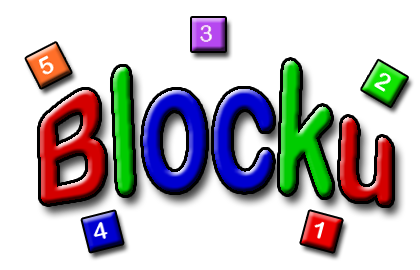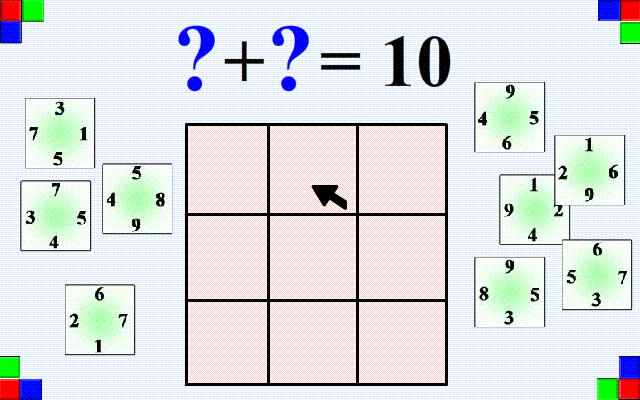Difference between revisions of "Activities/Blocku"
m (moved Blocku to Activities/Blocku: Preserve wiki structure) |
|||
| (18 intermediate revisions by 9 users not shown) | |||
| Line 1: | Line 1: | ||
| + | {{Activities/Blocku/Navigation}} | ||
| + | |||
[[Image:blocku.png]] | [[Image:blocku.png]] | ||
| + | {{:Blocku/status}} | ||
Blocku is a puzzle game consisting of filling a grid with squares by matching the squares sides by following a constraint. Blocku is a game that can be used by teachers to teach a multitude of subjects to students. The teacher will be able to create a constraint such as match the formula to the answer or A + B = C. Then the teacher makes a list with two columns. Each row in the columns is a pair of of matching objects. The first row of column A matches the first row of column B. Using this formula the game will randomly assign the objects of each column to square blocks, one object per side. The student then has to put all the pieces in a grid so that pairs on the sides of the squares follow the constraint. The student will be able to move the pieces as well as rotate them. | Blocku is a puzzle game consisting of filling a grid with squares by matching the squares sides by following a constraint. Blocku is a game that can be used by teachers to teach a multitude of subjects to students. The teacher will be able to create a constraint such as match the formula to the answer or A + B = C. Then the teacher makes a list with two columns. Each row in the columns is a pair of of matching objects. The first row of column A matches the first row of column B. Using this formula the game will randomly assign the objects of each column to square blocks, one object per side. The student then has to put all the pieces in a grid so that pairs on the sides of the squares follow the constraint. The student will be able to move the pieces as well as rotate them. | ||
| Line 8: | Line 11: | ||
To complete each puzzle the student has to match the sides of squares together so that the numbers finish the math equation at the top of the screen. The puzzle is completed when all pieces are used and are in the correct positions. Below is an example of how a game may progress. | To complete each puzzle the student has to match the sides of squares together so that the numbers finish the math equation at the top of the screen. The puzzle is completed when all pieces are used and are in the correct positions. Below is an example of how a game may progress. | ||
| − | |||
| − | |||
| − | |||
| − | |||
| − | |||
| − | |||
| − | |||
| − | |||
| − | |||
| − | |||
| − | |||
| − | |||
| − | |||
| − | |||
| − | |||
| − | + | [[Image:tutorial1.gif]] | |
| − | |||
| − | |||
| − | + | ==Special Modes== | |
| − | + | ===Survival=== | |
| − | + | This mode is used through the Quick Play menu. This will allow the student to start with a two tile puzzle and progressively build up to the max amount of tiles. | |
| − | |||
| − | + | ===Classroom=== | |
| − | + | This mode is used through the Custom Game menu. This allows students or teachers to setup a custom game and share it with other students. The students go to their neighborhood on their XO and click on the activity to join the game. | |
| − | [[ | + | ==License== |
| + | Blocku license is [[File:lgplv3.png]] | ||
| + | For more information concerning the licensing information please view: [http://www.gnu.org/copyleft/gpl.html GPLv3] | ||
| − | == | + | ==Contacts== |
| − | + | [mailto:mdemayo24@gmail.com Mark DeMayo] | |
| − | |||
| − | |||
| − | |||
| − | |||
| − | |||
| − | |||
| − | |||
| − | |||
| − | |||
| − | |||
| − | |||
| − | |||
| − | |||
| − | |||
| − | |||
| − | |||
| − | |||
| − | |||
| − | |||
| − | |||
| − | |||
| − | |||
| − | |||
| − | |||
| − | + | [mailto:arielzamparini@gmail.com Ariel Zamparini] | |
| − | |||
| − | |||
| − | |||
| − | |||
| − | |||
| − | |||
| − | |||
| − | |||
| − | |||
| − | |||
| − | |||
| − | |||
| − | |||
| − | |||
| − | + | [mailto:ifogburu@gmail.com Ihudiya Ogburu] | |
| − | + | [mailto:fran@dumetella.net Fran Rogers] | |
| − | |||
| − | |||
| − | |||
| − | |||
| − | |||
| − | |||
| − | |||
| − | |||
| − | |||
| − | |||
| − | |||
| − | |||
| − | |||
| − | |||
| − | |||
| − | |||
| − | |||
| − | |||
| − | |||
| − | |||
| − | |||
| − | |||
| − | |||
| − | |||
| − | + | [mailto:lorin.petersen@gmail.com Lorin Petersen] | |
| − | + | [mailto:mlc9545@g.rit.edu Matt Critelli] | |
| − | |||
| − | |||
| − | |||
| − | + | [mailto:kxi8435@rit.edu Kai Ito] | |
| − | + | [mailto:rwv5771@rit.edu Ryan Videlock] | |
| − | |||
| − | |||
| − | |||
| − | |||
| − | |||
| − | |||
| − | |||
| − | |||
| − | |||
| − | |||
| − | |||
| − | |||
| − | |||
| − | + | [mailto:crv8475@rit.edu Colin Videlock] | |
| − | |||
| − | + | [mailto:crf9284@rit.edu Corey Flickenger] | |
| − | |||
| − | |||
| − | + | [[Category:Activities]] | |
Latest revision as of 00:28, 21 April 2016
| Status: | Inactive Development Version 1.0 released 2/22/2011 |
Group Members: | Mark DeMayo |
| A math based sudoku style puzzle game. The player is given an answer and they have to complete the puzzle by matching the sides of the blocks together that, following the correct operator (+, -, *, /) will give them the answer. | |||
Blocku is a puzzle game consisting of filling a grid with squares by matching the squares sides by following a constraint. Blocku is a game that can be used by teachers to teach a multitude of subjects to students. The teacher will be able to create a constraint such as match the formula to the answer or A + B = C. Then the teacher makes a list with two columns. Each row in the columns is a pair of of matching objects. The first row of column A matches the first row of column B. Using this formula the game will randomly assign the objects of each column to square blocks, one object per side. The student then has to put all the pieces in a grid so that pairs on the sides of the squares follow the constraint. The student will be able to move the pieces as well as rotate them.
Description (original)
Blocku is a math based jigsaw puzzle. Blocku will come with a few pre-made puzzles. It will have a teacher edit tool where teachers can make their own puzzles. Puzzles can be as complicated as a castle or as simple as a square. The teacher will be given a grid where he/she can specify how the puzzle is supposed to look. Then the teacher chooses what type of operator he/she wants (+, -, x, /). Then the teacher inputs the answer. The activity randomly chooses what number will appear on the sides of each square.
To complete each puzzle the student has to match the sides of squares together so that the numbers finish the math equation at the top of the screen. The puzzle is completed when all pieces are used and are in the correct positions. Below is an example of how a game may progress.
Special Modes
Survival
This mode is used through the Quick Play menu. This will allow the student to start with a two tile puzzle and progressively build up to the max amount of tiles.
Classroom
This mode is used through the Custom Game menu. This allows students or teachers to setup a custom game and share it with other students. The students go to their neighborhood on their XO and click on the activity to join the game.
License
Blocku license is ![]() For more information concerning the licensing information please view: GPLv3
For more information concerning the licensing information please view: GPLv3

